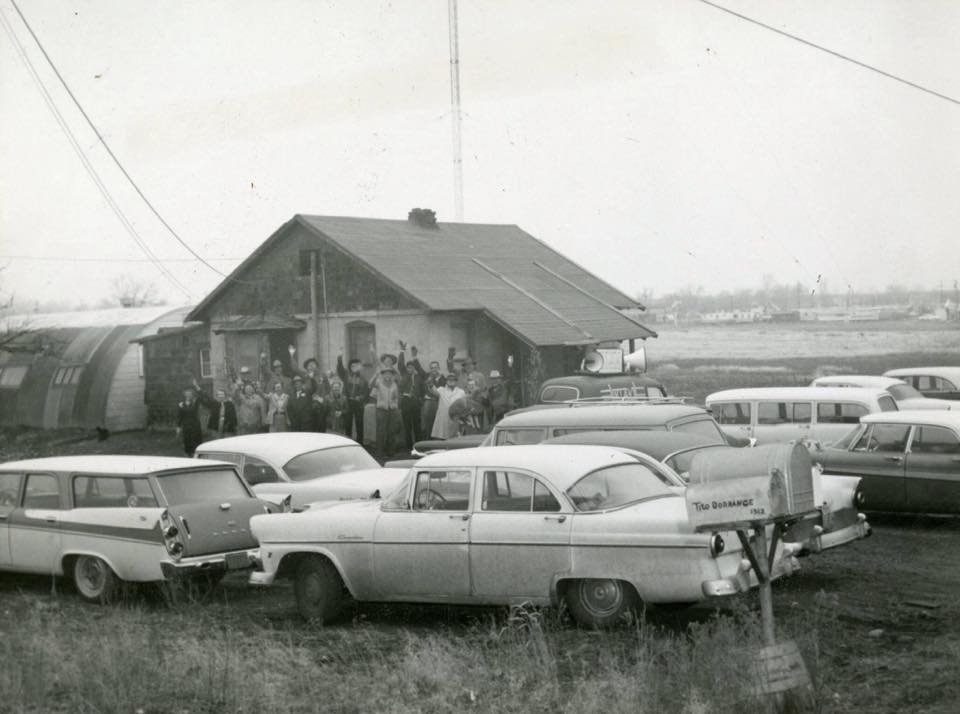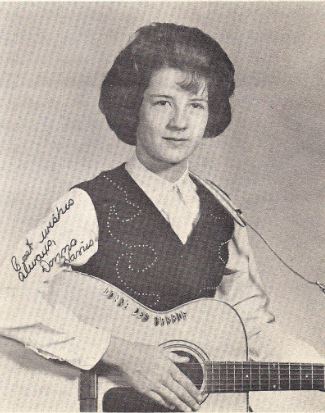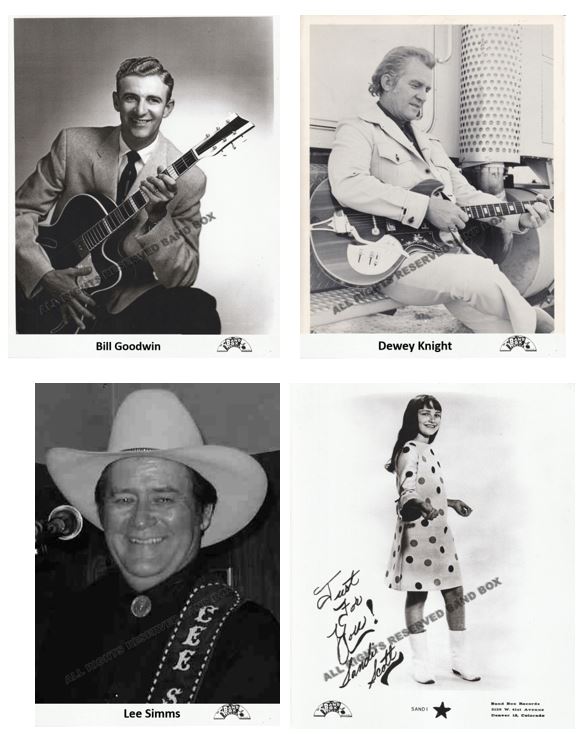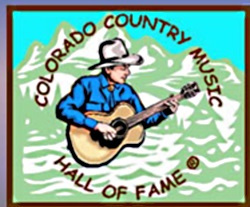From America’s Heartland to a Life in Country Music


We are proud to induct Buster Jenkins into the Pop Bop Rock Honor Roll
Life In Kansas on the Eastern Plains
I was delighted to come on to copy of Buster Jenkins’ autobiography “Tougher ‘n a Boot” which was published back in 2002. The title of the book certainly seemed appropriate I would learn, with Busters many run ins with tough cowboys, leather necks and later with some shady characters within the music business. The book is definitely worth the read!

Buster Jenkins was born Frankie Kannard in Woodson County in the State of Kansas in 1926. He and his family resided on a farm several miles outside of the town of Buffalo, Kansas located in the southeast section of the state near the Kansas/Missouri border.
Their lives were hard and challenging. The Jenkins’ farmhouse was small – no electricity – no running water. Frankie’s mother and father weren’t sold on the idea of him attending high school as they needed him to work on the farm. Neither had gone any further than the 6th grade.
Frankie learned to play the banjo first at the age of 5 and then the fiddle, banjo and guitar, learning from his father and other relatives. After he met a teacher who migrated from the east coast who was instructing music at Buffalo High School, he informed his parents that he indeed wanted to continue on to high school. They agreed, and so Frankie would take his place in the school band, playing lead violin or “fiddle” as Frankie would call it.

A Call To Service – WWII & Darrington, Washington
World War II was under way and Frankie was eager to take part. As soon as he graduated he made his way to Chanute, Kansas to take and pass his induction physical in spite of having a painful spine condition from an injury acquired on his family’s farm. His choice would be to enter the merchant marines where he would be able to realize one of his dreams, to sail the seas while supporting the war effort.
His ship hit the Pacific Ocean and there was always the threat of enemy subs and ships but his outfit successfully moved much needed cargo to where it was needed. After about a year in the merchant marines the war would suddenly end with Japan, but Frankie stayed on.

In 1950 Frankie would ship off to Hawaii delivering materials for the rebuild required which resulted after the Japanese attack back at the start of the war. He would participate in sea missions to Japan, China and would even deliver former German prisoners of war who were held in the States back to their homeland.
After his time in the service Kannard would take a job working on a steamer ship in Darrington. Washington and during that time would make the acquaintance of banjo player Fred McFalls, fiddle player Bill O’Conner and a guitarist Allen “Turkey” Reece who often played together in Darrington.
Back to the Mid West & Idaho Falls
The three would both follow Frankie back to the mid-west where they would join a revamped “National Barn Dance” troupe, touring Kansas and Missouri.
The Barn Dance wouldn’t remain revived for long and soon it folded. Frankie, along with Bill and Fred, would travel up to Idaho Falls, Idaho where they picked up some part time gigs. Talented Kannard would get extra work playing along with a bluegrass group called the “Carolina Mountain Boys”.
Eventually Bill and Fred felt they were too idle so they both decided to head back to Washington.
Back in Kansas, Frankie and one of his groups, which included Eddie King, another fiddle player, would become the house band on Wichita radio station KFBI on the “Sweet Lassie Cattle Feed & Hog Supplement Show” which was broadcast over two thirds of United States.

Return to the Pacific & War Calls Again
When that gig ended, Frankie went to work in Yates Center, Kansas in late 1950 taking a job hauling hay. He next decided that he would return to the merchant marines to get himself back on a ship and hit the high seas. He was stationed for a time in Hawaii where he would pick up night time gigs playing at a notorious strip night club called the “Club Huba Huba” in Honolulu.

The Korean War broke out in the summer of 1950. Frankie was stunned when he received a draft notice in the mail. Even though he had received an honorable discharge from his service during WWII in the merchant marines, he was nonetheless drafted into the the Korean War. He entered the U.S. Marines and was not happy about what he described as a ‘double cross’ by the government, not recognizing his former service as his contract had led him to believe.
But eventually things worked out okay. Frankie did not ship out to Korea but instead ended up being appointed “First Sgt.” in charge of hundreds of Marines in California even though he held the lower rank of corporal.
Back to Kansas
After the Korean War ended, Frankie returned to Kansas taking a job in a food market. In both 1956 and 1957 he would enter the Kansas State Fiddling Championship winning both times. The contest allowed him to enter again in 1958 but told him they would not permit him to win the trophy, not wanting to discourage others. He won the competition but the trophy would go to the 2nd place winner.
Frankie was tough and never one to shy away from a fight. He had his share both in and out of the military. He told a good friend that he was getting a bad name for himself. The musician friend, Eddie King, suggested a new name for a new start and from that day on “Buster Jenkins” would stick.
Denver Bound and KLAK
In 1960, Buster would head west to Denver, Colorado to seek out employment, hopefully in the music business. He had received a letter from one of his former band mates, Gene Poole who was living in Fort Collins, Colorado at the time.
Buster would contact the station manager of the radio station manager for country radio KLAK requesting an audition the station’s “Jamboree” program. The manager told him he would have to wait for an audition and Buster pleaded, saying he needed a job – any job.
KLAK had begun broadcasting in 1955, operating out of a small country church building just off of west Colfax and 1315 Oak Street, an area now revitalized for other interests – the old church long gone.

He was put in touch with KLAK’s owner Morey Davolt who provided Jenkins with a chance to become one of the station’s DJ’s. He landed the job and soon became the Rocky Mountain Jamboree show manager as well, remaining for nearly a decade.
During that time Jenkins would book top-of-the line talent and among the first to be booked were the Stanley Brothers – Carter and Ralph along with their group, the Clinch Mountain Boys. Jenkins had been given full control over the Jamboree and under his guidance it flourished
:format(jpeg):mode_rgb():quality(90)/discogs-images/A-1355815-1572338356-8261.jpeg.jpg)
Other big names would follow including Tom T. Hall, Freddy Hart, Jimmy Newman, Tommy Collins and Billy Grammer to name a few. While in Denver, Hall and Jenkins became friends and one night Hall would play a new tune he had just composed, “Harper Valley P.T.A.” a song which would go to number 1 both on the country and Hot 100 charts in 1968 for Jeannie C. Riley.


Buster’s own band who appeared regularly on the Jamboree were the “Gravy Soppers” and included the man who lured Buster to Colorado, Gene Poole on bass, his wife Betty Shubert, lead guitarist Bob Burgame and Don Henningson on steel guitar

While working and performing in Denver, Buster would meet Betty Schubert, a talented musician in her own right and the two of them would soon wed in 1963. They lived in the Golden area for several years before moving onto a large mountain acreage for a couple of years west of Denver.

Buster would depart KLAK in 1970, which ended the Jamboree’s run in Denver. Next, Jenkins put together a band, the “High Country Travelers”, and they managed to avoid being booked into low-paying bars, honky-tonks and night clubs, but instead accommodated commercial sponsors, playing for company events all around Colorado, Wyoming and Kansas – and earning much higher pay by doing so!

His band included bass player David Finn, steel player Dee Mullen, Tom Arnold lead guitar and others passed through the ranks during the 10 or so years they performed.
The Band Box & CLW Records Connections
During his time in Denver, Jenkins would produce several recordings for country musicians who either resided in or made their way to Denver. He would produce and often compose songs for many of these artists for two Denver-based record labels, Band Box, which was owned by Vicky Morosan in north Denver and CLW which was headed up by Jim Ward and located in Edgewater on the west side of Denver.

Back in 1962, Buster had convinced KLAK management into recording a Jamboree long play album during a live performance. The resulting recording was placed and distributed on the Band Box record label.

Jenkins would accompany a very young Band Box musician Sandi Scott to Nashville to help her kick off a country music career and would also work with Donna Harris would land a record produced by Jenkins on the national country charts, a response song to David Houston’s “Almost Persuaded” – “He Was Almost Persuaded”.


Rocky Mountain Jamboree
Jenkins Moves On
Buster and Betty along with their daughter Kallie, would eventually depart Colorado and headed off to a quieter life in Russellville, Arkansas where both of them took non-musical jobs although Buster eventually began playing music and performing again. Then, in later years with Kallie grown, Buster and Betty would return to his home state of Kansas settling down in Ottawa.
A Lifetime of Achievements

Buster was inducted into the Colorado Country Music Hall of Fame, the Mid-America Fiddler’s Hall of Fame, won nine national fiddling competitions, two Kansas State banjo picking contests, performed for former First Lady Rosalyn Carter at the request of Governor Bill Clinton in Arkansas, played a special performance for President Gerald Ford, provided the fiddling track for a National Geographic television show titled “The History of Old Time Music” and accomplished so much more along the way during a lifetime in country music.
Buster Jenkins passed away on June 29th, 2008.
Buster Jenkins Colorado Timeline







































Buster Jenkins Discography
Band Box Records LP 1998 – Buster Jenkins Presents Rocky Mountain Jamboree – 1962




Band Box Records 309 – Bill Goodwin – Heartaches – 1962
Jenkins composed the song


Band Box Records 338 – Dave Conley – The World You Live In b/w They’re Gonna Put Me In the Hoos-Gow – 1963
Jenkins produced and co-composed both sides


Band Box Records 345 – Bob Jamison – Is That The Reason Why b/w I’ll Leave The Front Door Open – 1963
Jenkins produced both sides


CLW Records 6572 – Jack Lyons – Why Do You Let Me Hang Around b/w Will You Go Find My Daddy – 1965
Buster Jenkins produced both sides and co-composed the “A” side


CLW Records 6578 – Donna Harris – Time To Hurt Again b/w Please Mr. D.J. – 1965
Jenkins co-composed A side – composed the B side and co-produced both sides



CLW Records 6582 – Larry Green – Pages Of Time b/w That Little Girl of Mine – December, 1965
Jenkins co-produced both sides



CLW Records 6583 – Doug McLain – Before You Blow The Match Out b/w I Feel You In His Arms – January, 1966
Jenkins co-produced both sides



ABC Records 10839: Donna Harris – He Was Almost Persuaded (charted number 45 Country nationally) b/w I’m Sending Him Back Home To You – August, 1966


Band Box Records: 378 – Dewey Knight – A Mind Of Your Own b/w We Can’t Afford To Win – 1967


Band Box Records 379 – Bobbi Kaye – Ruby’s Stool b/w Please Don’t Let Me Want Him – 1967
Jenkins produced both sides and co-composed the “B” side




ABC Records 10921 – Donna Harris – I Just Now Remembered I Forgot b/w My Hi-Fi To Cry Boy – 1967
Jenkins produced both sides

Band Box Records 380 – Sandi Scott – Fist City No 2 b/w Just A Tear Away From A Real Good Cry – July, 1968
Jenkins produced by sides of the record



Band Box Records 384 – Sandi Scott – Point One Finger b/w Big Old Heart – October, 1968
Jenkins produced both sides of the record


High Country Records 68001 – Dewey Knight – Haulin’ My Last Load b/w How She’s Forgetting Me – October, 1968
Jenkins produced both sides and co-wrote the “A” side


Keyboard Records 709 – Lee Sims County Trio – Husbands and Wives b/w Paralyze My Mind – July, 1969
Jenkins produced both sides


Rustique Records 711 – Lee Sims and the Ronnie Steele Trio – Indian Tears b/w Married to Wine – 1969
Jenkins produced both sides


High Country Records 69003 – Curtis Willis – She Just Lay’s There b/w The Whole Town’s Looking Down On You – 1969
Jenkins produced both sides



High Country Records 69006 – Jerry Street – Cold Cold Winter Comin’ On b/w Don’t Worry About the Poor Folks – 1969
Jenkins produced both sides and co-composed the “A” side


High Country Records 70007 – Jerry Street – Table Number Three b/w I’m Goin’ Crazy – 1970
Jenkins produced both sides and co-composed both sides


High Country Records – Bob Jamison – Everything Including You (Belongs To Him) b/w You’re Gone – 1970
Jenkins co-composed the “A” side


High Country Records 70011 – Jerry Street – The Same Old Thing b/w Listen They’re Playing My Song – 1970
Jenkins produced both sides


High Country Records 720013 – Buster Jenkins – Idaho Blues b/w A Guy They Call Joe – 1970


(No Label Name) LP – Buster Jenkins and Indian, Creek Bluegrass – Oklahoma Territory – 1978
Members: Dennis “Shotgun” Bailey – banjo & vocals; Ernie Martinez – mandolin & vocals; John Gretzinger – dog house bass & vocals; Jack Crites – lead vocals; Stan Holmes – dobro – Buster Jenkins – rhythm guitar and fiddle



Great Northern 1014 LP – Buster Jenkins and High Country Bluegrass – A Man And His Music and Some Friends – 1979
Members: Buster Jenkins – fiddle & vocals; Stan Holmes – dobro; Dennis Bailey – banjo & vocals; John Gretzinger – bass & vocals – Ernie Martinez – mandolin & vocals; Vern Ellis – rhythm guitar; Warren Kenninson – rhythm guitar & vocals



